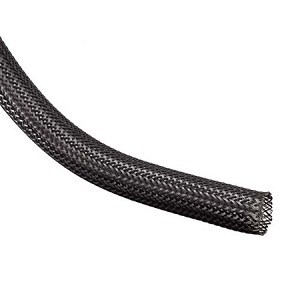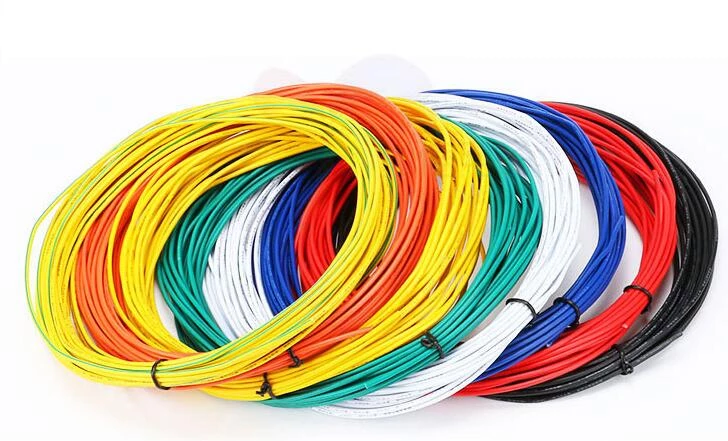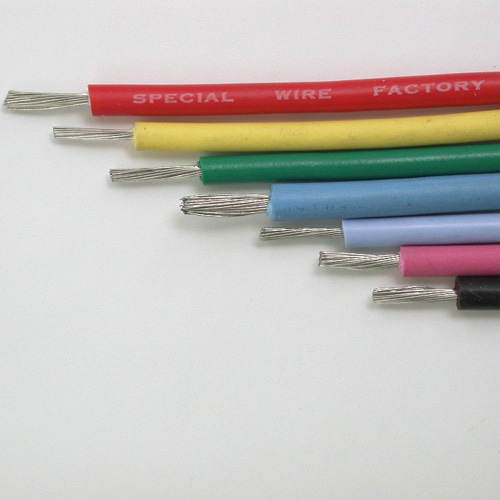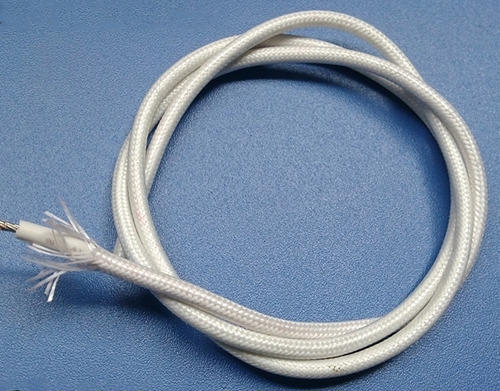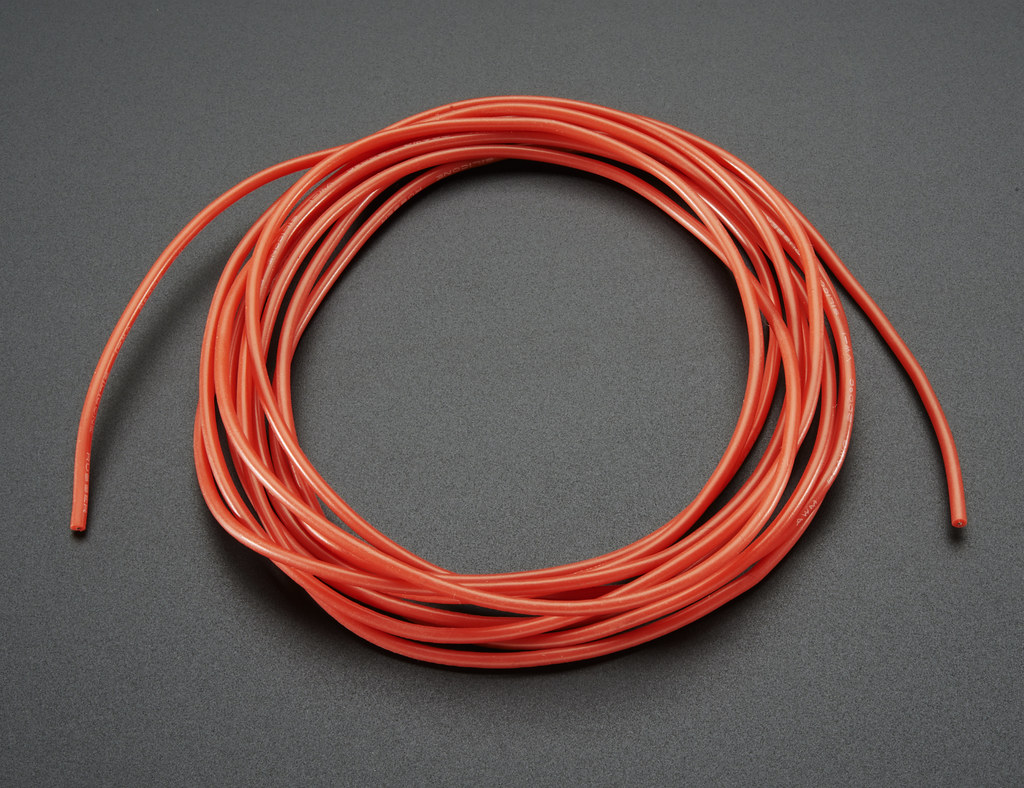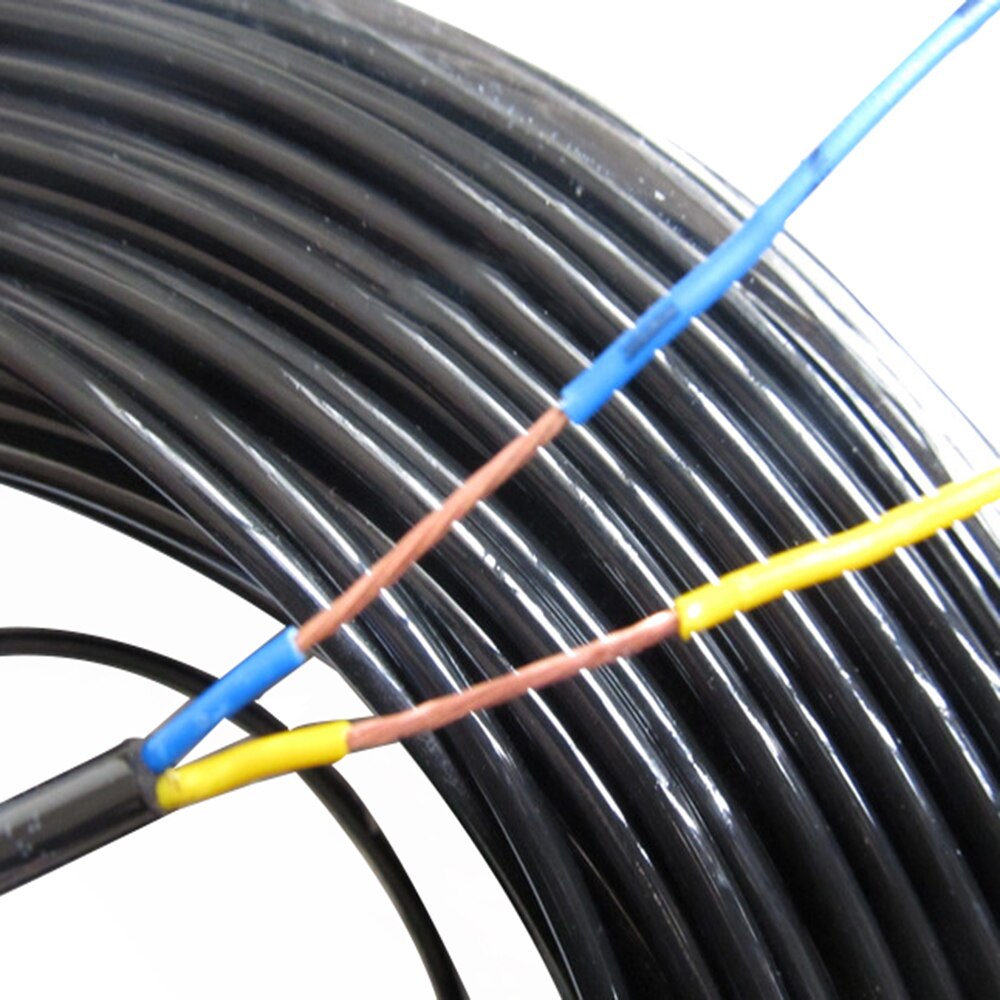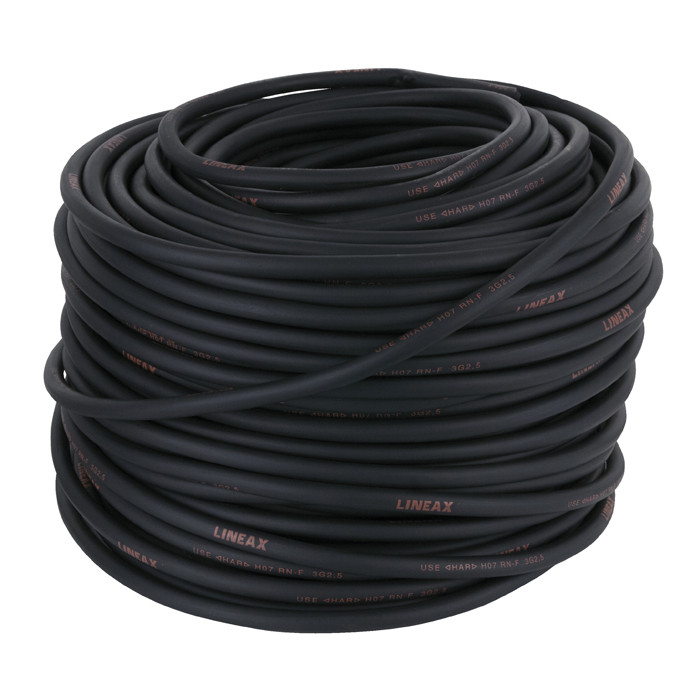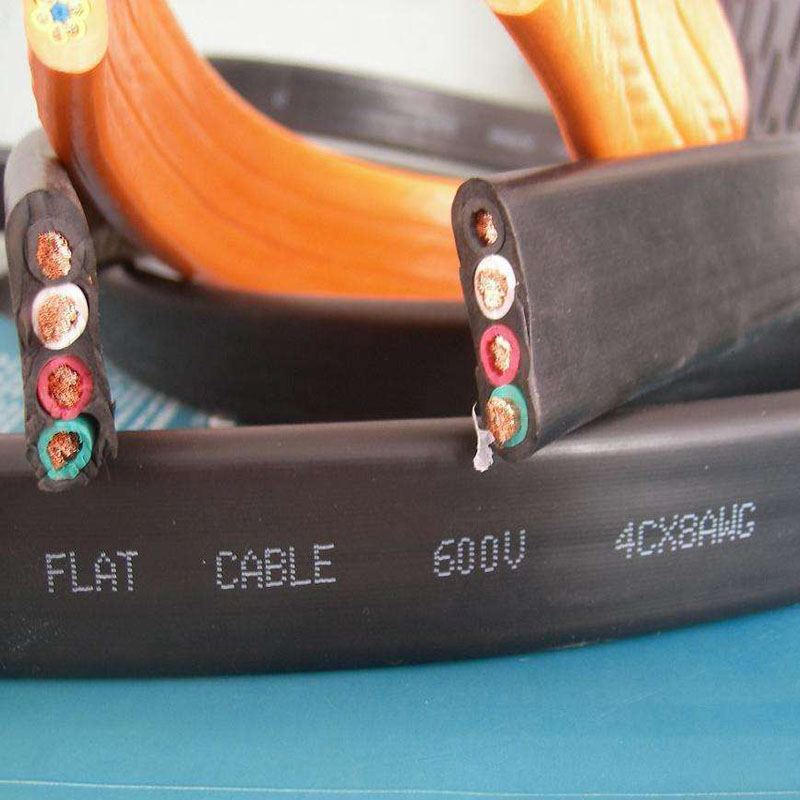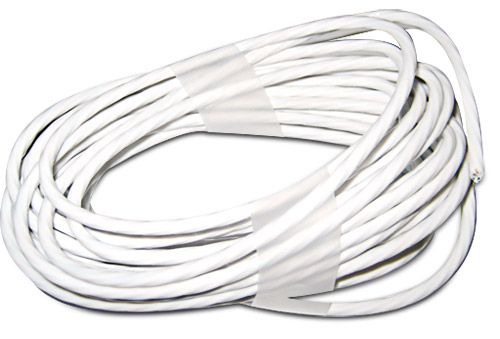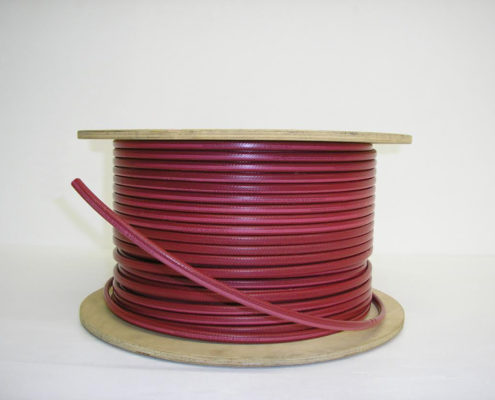Wire Insulation
Table of Contents
The insulation is a thin, insulating coating surrounding a wire. They are typically made from plastic or rubber-like polymers. Without insulation, neighboring wires would be able to make direct contact with one another leading to interference. Insulation also protects the wire from damage and from its environment. The specific material used affects certain aspects of the wires function such as flexibility, resistance to moisture, static or heat and mechanical strength.
Some examples of commonly used materials include PVC, polyethylene, silicon, fiberglass, and various types of rubber.
Nylon
Nylon is flexible and provides good protection against cuts and scratches as well as various chemicals. Compared to other materials, it is more susceptible to moisture damage. Nylon is commonly extruded over other insulating materials as an extra layer of protection [1].
| A nylon sleeve, placed over wires for protection [10] |
|---|
Polyvinyl Chloride (PVC)
PVC is one of the most commonly produced polymers worldwide. It provides good protection against moisture, ozone, and fire. PVC's non-toxicity combined with it's affordability and other properties makes it a good general purpose material, however its limited temperature range (around -50° to 100° Celsius) means it isn't suitable for all applications [2].
| Bundles of PVC wire [11] |
|---|
Polyethylene
Polyethylene carries good electrical properties with its low dielectric constant and capacitance. It also provides good protection against moisture, acids, alkalis among other things. Notably, it is susceptible to moderately high temperatures (runs into issues at around 80° Celsius) and is also flammable [3].
| Polyethylene wires [12] |
|---|
Fiberglass
Fiberglass is excellent for applications at high temperatures, continuing to function up to around 500° Celsius. It commonly sees use in kilns and metal processing for this reason. Though it varies with the specific material, it can also provide mechanical strength or protection against moisture and various chemicals [4].
| Fiberglass insulated cable [13] |
|---|
Silicone
Silicone is a popular choice for wire insulation. It provides flexibility and good heat/flame resistance, though it isn't quite as durable as some other materials [5].
| A wire with a silicone jacket [14] |
|---|
Polyurethane
Polyurethane is typically avoided in most applications due to its poor electrical properties as well as its flammability. However, its mechanical strength and flexibility even at low temperatures combined with its resistance to water and chemicals makes it a good choice in harsh environments such as the ocean where its drawbacks aren't as relevant [6].
| A bundle of polyurethane wire [15] |
|---|
Neoprene
Also called polychloroprene, neoprene is a synthetic rubber with good mechanical strength and resistance to various chemicals. It is also flame retardant. Due to its weak electrical properties, it tends to only be used when its durability is a necessity, such as in industrial environments [7].
| A bundle of Neoprene wire [16] |
|---|
Styrene-butadiene
Styrene-butadiene is a synthetic rubber derived from Styrene and Butadiene. It is similar to neoprene in terms of its durability [4].
| A styrene-butadiene ribbon cable [17] |
|---|
Polytetrafluoroethylene/Teflon (PTFE)
PTFE, branded as Teflon, is a flexible and durable fluoropolymer which provides excellent protection against fire and chemicals. It is effective over a wide range of temperatures and has good electrical properties. PTFE mainly sees use in military or aerospace applications as well as in coaxial cables [8].
| A bundle of Teflon cable [18] |
|---|
Perfluoroalkoxy alkane (PFA)
PFA is a fluoropolymer material that combines a wide range of effective temperatures with good mechanical strength as well as resistance to flames, acids, UV and various chemicals. It is often used for thermocouple wire (wire used to measure temperature) and for various industrial applications. Note that PFA is quite expensive, making it a poor choice for general use [9].
| A spool of PFA cable [19] |
|---|
References
| [1] | “The Different Types of Wire & Cable Insulations!,” Sycor, 31AD. [Online]. Available: https://www.sycor.com/blog/post/wiring-insulation-types/. [Accessed: 18-Oct-2021]. |
| [2] | “PVC / Polyvinyl Chloride,” Galaxywire, 23-Jul-2021. [Online]. Available: https://www.galaxywire.com/custom-wire-cable/jacket-insulation/pvc-polyvinyl-chloride/. [Accessed: 18-Oct-2021]. |
| [3] | “PE/Polyethylene,” Galaxywire, 23-Jul-2021. [Online]. Available: https://www.galaxywire.com/custom-wire-cable/jacket-insulation/pe-polyethylene/. [Accessed: 18-Oct-2021]. |
| [4] | “Wire insulation types and purposes explained,” The JEM Electronics Blog: News, Insights, Tips, and More!, 06-May-2020. [Online]. Available: https://blog.jemelectronics.com/wire-insulation-types-explained. [Accessed: 18-Oct-2021]. |
| [5] | “Silicone,” Galaxywire, 23-Jul-2021. [Online]. Available: https://www.galaxywire.com/custom-wire-cable/jacket-insulation/silicone/. [Accessed: 18-Oct-2021]. |
| [6] | “PUR/Polyurethane,” Galaxywire, 23-Jul-2021. [Online]. Available: https://www.galaxywire.com/custom-wire-cable/jacket-insulation/pur-polyurethane/. [Accessed: 18-Oct-2021]. |
| [7] | “Neoprene,” Galaxywire, 23-Jul-2021. [Online]. Available: https://www.galaxywire.com/custom-wire-cable/jacket-insulation/neoprene/. [Accessed: 18-Oct-2021]. |
| [8] | “PTFE / Teflon / Polytetrafluoroethylene,” Galaxywire, 23-Jul-2021. [Online]. Available: https://www.galaxywire.com/custom-wire-cable/jacket-insulation/ptfe-teflon-polytetrafluoroethylene/. [Accessed: 18-Oct-2021]. |
| [9] | “PFA/Perfluoroalkoxy,” Galaxywire, 23-Jul-2021. [Online]. Available: https://www.galaxywire.com/custom-wire-cable/jacket-insulation/pfa-perfluoroalkoxy/. [Accessed: 18-Oct-2021]. |
| [10] | Nylon Expandable Monofilament Braided Sleeving. Electriduct. |
| [11] | 100M UL1007 solder wire electronic wire 24AWG cable jump wire 1.4mm PVC Cable UL1007 300V/80C 11/0.12TS. AliExpress. |
| [12] | UL3266 Irradiated Polyethylene (PE) Insulated Wire. Senhall. |
| [13] | Fiberglass Insulated Cables. Aggarwal Electrowires Private Limited. |
| [14] | Adafruit Industries, Silicone Cover Stranded-Core Wire - 2m 26AWG Red. 2014. |
| [15] | TPU Polyurethane Sheathed Wire 2X0.85 Square 2Core Cable Explosion-proof Wear-resistant Antifreeze Nuclear Power Plant Wire AliExpress. |
| [16] | Lineax Lineax Neoprene Cable, Black Highlite. |
| [17] | Natural styrene-butadiene insulated EPR insulated neoprene sheathed flat rubber cable YB/YBF/YBZ Tiankang Cable |
| [18] | WC2 5-WIRE TEFLON™ INSTALLATION CABLE Aircraft Spruce |
| [19] | Heating Cable Thermal Flex Systems Inc. |
Contributions:
| User | Last Update |
|---|---|
| Kailin Weng | 1265 days ago |
| Mayurakhi Khan | 1265 days ago |
